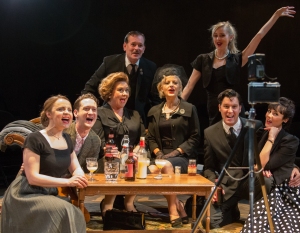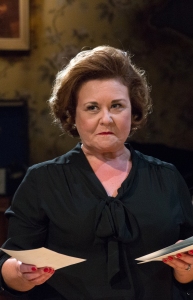Truth and its many voices
Tonight I’m Gonna Be The New Me – Made in China @ Soho Theatre, until Sat 26 September (tickets)
Following rave reviews for Made In China’s previous work, Gym Party, and having caught the scorching This is how we die by associate dramaturg, Christopher Brett Bailey, I had already mentally
clocked the company as one to keep an eye on. Their previous work had been built on a reputation for intelligently confrontational productions powered by a strong interest in purposely playful  narratives, and their latest proved to be no exception.
narratives, and their latest proved to be no exception.
Tonight I’m Gonna Be The New Me takes the form of a monologue by Jess (Jess Latowicki) that covers the realisation that the sun was beginning to set on her relationship with Tim (Tim Cowbury). However her performance is subject to occasional interruptions by Tim, who is described as a playwright. As the performers names suggest the meta-fictionality is taken a stage further by the fact that Jess and Tim are a real-life couple and are credited as co-authors of the production; further blurring the level to which the monologue represents a fictional truth.
Through a series of well-handled, informal interactions with the audience, Jess explicitly draws the audience into the action. Whilst a play naturally requires an audience to witness the action, the role is often a passive one. Here we are pulled closely into Jess’ character, through her direct engagement, whilst Tim remains an off-stage blank. We become increasingly complicit in the action, and begin, on request, to speak the lines of the play. Forced through the participatory nature of theatre, and through the natural instinct to follow social convention, we become Jess’ mouthpiece in the acrimonious exchanges with Tim. We become her justifier and her defender against a strangely silent, impassive character.
Except Made In China are too smart for such an obvious narrative structure. The play throws up much more interesting questions about their relationship dynamic as Tim’s role as co-author becomes clearer. Early on he comments that Jess drops a line, and later we are told that he is written his own death scene. We are forced to contend with the fact that Jess’ offhand, friendly on-stage persona may be nothing more than a construct of Tim’s writing. It as if the curtain has been pulled back to show the insides of a room only to discover on closer inspection that it is in fact a trompe l’oiel.


 press reviews. The complaints primarily centre on a script criticised for presenting a series of cardboard cut-outs instead of characters, and it does not do itself many favours by presenting itself as ‘a mucky romp through the morals, memories and music of the 1950s’. The line conjures up images of bedroom farce and end-of-pier innuendo, whereas it feels like Page & Kirk are trying to find a way into rather more dark territory. If
press reviews. The complaints primarily centre on a script criticised for presenting a series of cardboard cut-outs instead of characters, and it does not do itself many favours by presenting itself as ‘a mucky romp through the morals, memories and music of the 1950s’. The line conjures up images of bedroom farce and end-of-pier innuendo, whereas it feels like Page & Kirk are trying to find a way into rather more dark territory. If 




 may have been giving voice to Claudius’ concern about how to deal with Hamlet following the death of Polonius, but these fifteen words pithily capture the frenzy surrounding Benedict and the Bard.
may have been giving voice to Claudius’ concern about how to deal with Hamlet following the death of Polonius, but these fifteen words pithily capture the frenzy surrounding Benedict and the Bard.

